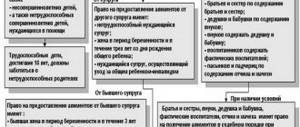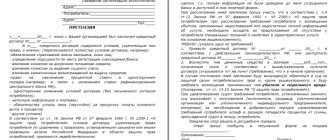The Family Code of the Russian Federation is the main act regulating family relations on the territory of the state. Each article of the Family Code is intended to regulate all types of relationships in the family, for example, marriage and divorce or the collection of alimony for a child after a divorce. It is the articles regulating alimony that deserve close consideration, since many may have to face them.
You may also be interested in:
- How is child support calculated? Examples of calculations
- Until what age is child support paid in Russia?
- The procedure for paying and collecting alimony according to the Family Code of the Russian Federation
Is a common-law wife entitled to alimony?
Many modern people are quite skeptical about the institution of marriage, believing that “a stamp in a passport does not change anything.” They live together and have children in a so-called “civil marriage.” By the way, the name is erroneous, since a civil marriage was originally called a marriage registered by state authorities, as opposed to a church one.
When applied to emotions, the “stamp” really “doesn’t change anything.” In the social space, everything changes radically. “Civil” couples often face unpleasant consequences that they do not think about at the beginning of the relationship. During separation, no court will help to fairly divide property and protect housing rights. Civil spouses are not included in the list of legal heirs. In the event of an emergency, they often cannot obtain information about their “other half”, because... it is given only to relatives, etc.
Same with alimony. Only the “real” wife has the right to them. “Civil” is not entitled to anything by law. She will receive child support (if paternity is voluntarily recognized by the man or proven by the court). Never on yourself.
Alimony obligations to a disabled wife
The participation of a specific person in a civil proceeding as a party, i.e., a plaintiff or defendant, is determined by the presence of an assumption that the plaintiff has rights or interests protected by law, and the defendant is the bearer of a disputed obligation to meet the plaintiff’s demand.
The main criterion for the above citizens is need. They need to prove that they really cannot do without the financial support of their ex-spouse.
Parents are required to support their children from birth until the age of 18, unless the child marries or is emancipated earlier. Parents must support the child, even if he does not need financial assistance. The incapacity of parents, recognition of their incapacity in court, or deprivation of parental rights also does not relieve one from this obligation. When the parental rights of one of the parents are deprived and the child is transferred to be raised by another parent, guardian or trustee or adoptive parents, alimony is collected in favor of these persons in accordance with Articles 81-83, paragraph 1 of Article 84 of the RF IC.
Alimony for wife during marriage
Financial support by spouses for each other is not only “normal” and “natural”. Its necessity is legislated (Article No. 89 of the RF IC).
This requirement of law and morality becomes especially relevant in the case of joint children. A pregnant woman, and a woman caring for a baby, is not able to earn her own living. “Children’s” state benefits are not designed to allow a mother and child to fully exist without it - it is only a small material benefit to ease the parental burden, intended exclusively for the needs of the child within the framework of state protection of his rights.
In such a situation, taking full responsibility for providing for the family is the direct duty of a man. And if he evades him, the law comes to protect the rights of his wife.
A woman can apply for alimony through the court and get her husband to allocate a certain amount of money for her monthly living.
What is the amount and amount of alimony for a non-working person in 2021
The definition of the maximum and minimum amount of alimony payments in the Russian Federation is not fixed by law. This fully applies to persons who do not have official work in 2021.
The principles apply here:
- Responsibilities to raise and financially provide for children by both parents.
- Taking into account the necessary costs to provide for the child’s vital needs and for his development.
- Correlation of the amounts of assigned alimony obligations with the size of the current subsistence level in the region of residence of the children or the corresponding subsistence minimum in Russia.
- Studying the financial situation and life circumstances of the father and mother.
The method for determining the amount of alimony obligations by a judge, including for a person who finds himself unemployed or without an official income, is to take into account the specified principles.
In what cases does a husband pay alimony to his wife?
So, according to the already mentioned article of the RF IC No. 89, in order to collect alimony from a husband for the maintenance of his wife, the following conditions are necessary:
- Officially registered marriage
- Wife who is unable to work and in need of financial support
The following circumstances make a woman unable to work and/or in need of financial support:
- Pregnancy
- Being on maternity leave (and a child under three years old)
- Caring for a disabled child under 18 years old, plus her insufficient income
- Caring for a child recognized as a disabled child, regardless of age (disability groups I and II), plus her insufficient level of income
- Her personal and/or health-related disability
Let us dwell in more detail on the most common grounds for a wife to receive alimony from her husband.
Alimony for pregnant wife
Carrying a child in common with a man is a legal reason to seek financial support from your husband (or to the court, if the husband is against supporting his pregnant wife). No additional basis for alimony other than pregnancy is required. A simple certificate from the antenatal clinic is enough.
Alimony for a pregnant wife can be assigned both during marriage and after divorce.
ATTENTION! In legal practice, the father of an unborn child is automatically a man married to his mother. The “law of 300 days” is also in force (Article No. 48 of the RF IC). A man is considered the father of his ex-wife's child if less than 300 days have passed between the date of divorce and the birth of the child. If a man doubts his biological paternity, he will have to resort to genetic testing. There is no other way to avoid alimony for a pregnant wife, even if she is expecting a child from another man.
How much alimony will a pregnant wife receive from her husband?
This point is regulated by law (Article No. 91 of the RF IC). But the actual amount of alimony is not determined by the law. Spouses can:
- agree on a specific amount yourself by concluding an oral agreement or writing and notarizing it
- go to court, which, after considering all the circumstances and taking into account the man’s income level, will determine the amount of alimony
Alimony for a pregnant wife, unlike child support, is never assigned in the form of a percentage of income - only in the form of a fixed monthly amount.
Alimony for spouse on maternity leave
In Russia, a woman’s right to a four-month “sick leave” for childbirth and partially paid leave to care for a child up to 3 years is legally enshrined. But state benefits, although they provide tangible assistance to wealthy families, do not fully cover the needs of the mother and child if the husband does not “feed” the family.
Alimony from the husband is considered an additional way to protect the rights of motherhood and the rights of the child. A man is required to support the mother of his child (in addition to child support) for the first three years.
If the child is disabled, alimony for him and his wife can be collected until the age of 18 or indefinitely (depending on the disability group and other circumstances)
How much alimony is due to a wife on maternity leave?
As mentioned above, the specific amount is not indicated in Article No. 91 of the RF IC, which regulates this issue.
The general principles are the same as in the case of paying “pregnancy alimony”:
- you can negotiate on your own
- you can sue
Alimony for a mother on maternity leave is also collected exclusively in a “firm”, fixed form, based on the level of PM in the region. If at the same time alimony is being collected for a child or children, it can be calculated as a generally accepted percentage of income (25% for 1 child, 33% for 2, 50% for 3+)
ATTENTION! Child support for triplets plus their mother is one of the rare cases where a man's child support payments can exceed half of his income. In normal situations, more than 50% cannot be recovered. But since such cases are considered exceptional, a deduction of up to 70% of the salary is allowed
Who can receive alimony?
The Family Code of the Russian Federation (chapters 13 and 14) stipulates the categories of citizens who have the right to collect alimony from an able-bodied person (spouse, parent or child). These include:
- children under the age of majority;
- spouse during pregnancy with a common child and for 3 years from the date of his birth;
- a spouse supporting a disabled child;
- adults recognized as incapacitated or disabled;
- a spouse recognized by law as incapacitated.
Thus, any person related to one of these categories has legal rights to financial support in the form of alimony.
Family law. Custody and alimony
Alimony to wife after divorce
It is believed (and not without reason) that if it was not possible to reach a normal agreement peacefully, it is much more difficult to collect alimony from the husband in court after a divorce. Women are ready to do this for the sake of their children in order to force “irresponsible” fathers to participate at least a little in their upkeep. But it is extremely rare that they put forward claims to collect alimony on themselves.
And, by the way, in vain. The law guarantees their protection, and the ability to use the provisions of the law is the effective protection of one’s civil and personal rights.
In the meantime, let’s consider in what cases the ex-wife has the right to receive alimony from her husband, and under what conditions.
Grounds for paying alimony to an ex-wife
We have already discussed the conditions associated with pregnancy and childcare. There are several other grounds for alimony that apply only to women, regardless of children, their age and state of health:
- A woman lost her ability to work (became disabled group I or II) during marriage or during the first year after divorce. At the same time, she was recognized as needy - in a difficult financial situation
- The woman lived in marriage with this man for a long time and reached retirement age 5 or less years after the divorce. At the same time, she must also be recognized as needy, low-income
Terms of payment of alimony to ex-wife
So, as can be understood from the previous section, two conditions are required - disability and need - for a woman to receive the right to receive alimony from her ex-husband. Let's look at them.
Disability is a person’s condition in which he cannot work regularly and receive normal earnings. In addition to pregnancy and round-the-clock care for babies, of course, retirement age or disability of group I or II makes a woman incapacitated.
Neediness is a financial situation that does not provide the opportunity to satisfy the basic needs of life. There are a number of generally accepted markers for determining need - for example, the discrepancy between the income of the PM (income means the totality of pensions, social benefits, and possible earnings). The degree of need is determined by the court taking into account specific circumstances (for example, the need for expensive treatment or supportive procedures to prolong life).
ATTENTION! To receive alimony from her ex-husband, the wife must meet both conditions: be disabled and in need at the same time. This doesn't always match. For example, a successful businesswoman who falls ill and becomes disabled is not in need - she has a decent income, savings, or at least the opportunity to sell the business. A young, healthy, unemployed woman is certainly in need. But she has the opportunity to support herself, since she is able to work.
Need and disability must be proven only in cases where alimony is collected exclusively from the wife. Alimony for wives who care for small children and disabled children does not require proof of the woman’s incapacity and need.
If a man does not work and does not apply to the employment center
There are situations when men, not having an official job, do not seek one and do not go to the employment service to receive benefits. In most cases, such inaction is a way of evading legal payments.
In such cases, it is necessary to conduct a thorough clarification of the circumstances that reveal the “secret” on what means such a draft dodger lives. In any case, he has some source of income.
In addition to the salary and the already mentioned unemployment benefit, this, in accordance with Government Decree No. 841 of July 18, 1996, can be:
- old age or disability pension;
- scholarship;
- rent from renting out an apartment;
- income from the activities of an entrepreneur;
- payment under a civil contract.
Alimony to the wife of a disabled person and a pensioner
So let's repeat. According to Article No. 90 of the RF IC (clause 1), an ex-wife has the right to receive alimony from her ex-husband if:
- became disabled during marriage or the first year after divorce
- reached retirement age less than 5 years after the divorce, in cases where the marriage lasted long enough
How much alimony will a disabled wife and a pensioner receive from her husband?
As in most “alimony” articles, No. 90 (clause 1) of the RF IC does not provide any specific amounts. It only states that former spouses can:
- reach an independent agreement on an amount that suits both (orally or in written, notarized form)
- go to court, which will calculate a fixed alimony rate based on the specific situation
ATTENTION! The law does not provide for either a maximum or minimum amount of such alimony. If the ex-spouse is wealthy and compassionate, he may voluntarily provide the disabled ex-wife with enough money so that she does not need it (but in such cases there is usually no need to resort to court assistance). The court usually assigns small amounts (a percentage of the PM). If the ex-husband is a pensioner himself without additional income (or with unofficial income, the presence of which cannot be proven), he will not receive alimony at all.
For what reasons is the defendant's payment reduced?
It is not necessarily the unemployed parent who is obligated to pay child support who is trying to evade it. There are situations when a person experiences financial difficulties after losing a job and having no other sources of income. During this period, he may indeed not have enough funds to fully support the child.
If certain facts exist, the law provides for the possibility of reducing alimony payments. The judge may do this if:
- unemployment benefits decreased;
- other income has decreased or ceased to exist;
- an unemployed child support worker got married and had a child;
- he is entitled to alimony for other claims;
- the debtor is seriously ill or disabled;
- his parents came to provide for him;
- a wife or child has the opportunity to use expensive real estate or a car to generate income.
Although this list is enshrined in law, it is not closed. The court may take into account other problems of the unemployed alimony worker, but only if there are compelling arguments in the form of written documents or witness testimony.
When does a wife lose the right to alimony from her husband?
According to the law, a husband (both former and current) is exempt from paying alimony to his wife in the following cases:
- The marriage did not last long (the law does not contain an exact period, the court is guided by the circumstances)
- The wife has behaved or is behaving inappropriately in the marriage (abuses alcohol or drugs, does not take care of the children, demonstrates immoral behavior, etc.)
- Disability occurred through the fault of the woman herself (usually as a result of the same drug or alcohol abuse)
- After a divorce, a woman entered into a new marriage (even if it was short-lived and broke up at the time she received disability)
In addition, as mentioned earlier, the determining factor for this type of alimony is the husband’s financial ability to support his ex-wife. Only his official income is taken into account.
ATTENTION! In the case of “child” alimony, the court is always ready to accommodate in order to enable the woman to prove that her ex-husband has hidden income or unofficial earnings (since we are talking about protecting the rights of the child, which is a kind of “legal trend”). When collecting alimony for your ex-wife, everything is much more complicated. An experienced family law attorney may be able to help you succeed. But a lot depends on the characteristics of each specific situation.
Calculation of alimony
The procedure for paying alimony for a common-law wife and alimony for the maintenance of a minor child is the same in a civil and in an official marriage. The parent who lives separately must pay a certain (fixed by law) percentage of his income. It is worth noting that this refers not only to official salaries, but also to all other financial income. This may be income from the rental of movable or immovable property, as well as wages from a second job, interest on bank deposits, and so on.
Interest
It is worth noting that the share of the payment directly depends on the number of minor children. This is regulated by Art. 81 IC RF. In the case of one child, 25% of income is paid, with two - 33.3%, with three or more - 50%.
Fixed amount
In some cases, the percentages described above are neglected. This can happen even unilaterally if the court has issued a corresponding verdict. A fixed payment in fixed monetary terms may be paid if:
- the parent who takes care of the child does not have an official source of income;
- the parent receives income in another currency;
- the parent paying child support wants to give more;
- there are other compelling reasons protecting the interests of the child.
All possible options for calculating alimony can be quickly calculated using our online calculator.
Voluntary procedure for obtaining alimony for a wife from her husband
Article No. 91 of the RF IC provides for the possibility of concluding a voluntary alimony agreement between a husband and wife (it makes no difference whether they are divorced or remain married).
This could be a simple verbal agreement. In a legal sense, it is similar to a “civil marriage” - its implementation depends entirely on the goodwill of the parties. If the husband “promised” alimony but does not pay, there is no leverage over him. A written and notarized agreement has the force of a writ of execution.
A written child support agreement must contain:
- All passport data of both parties: full name, series/number, by whom it was issued, place of permanent registration and place of residence, if it does not actually coincide with registration
- Grounds for payment of alimony and list of agreements reached:
- term (indefinitely or for a certain period)
- the amount and frequency of its payment (you can agree on weekly, monthly, etc., payment)
- method of transferring funds (in person, by transfer, to a card)
- all additional conditions are at the discretion of the parties
- Date and personal signatures of husband and wife
You can find examples of such agreements and focus on them. Or contact a family lawyer from the Prav.io portal. They will explain to you how to correctly compose a document or give you a verified link to safely download the sample.
Law on indexation of alimony payments
This law was adopted a long time ago, but, nevertheless, it is worth attention. Article 117 of the Family Code of the Russian Federation provides for indexation of alimony payments assigned in a fixed amount. Since the amount of these alimony penalties is calculated based on the cost of living, the amount of alimony should change in proportion to its increase.
It is worth considering that the cost of living is determined every quarter, based on the cost of the consumer basket.
Thus, by spending some time studying the Family Code, you can understand the processes for assigning alimony and study measures to force the payment of debts. With this information, you can understand which article of the Family Code in case of unlawful actions will help you make the right decision during legal proceedings related to the payment of alimony.
What you can do right now:
- Carefully study the legislative framework to understand your rights in more detail.
- Contact a lawyer for qualified assistance
- Do not forget that evasion of alimony payments can lead to criminal liability.
How to file for alimony for wife maintenance?
If it was not possible to conclude a voluntary agreement, you can (and should) try to protect your rights through the court.
Procedure
If you have already had experience in filing a claim in court for child support, we will not tell you anything fundamentally new - everything is done in approximately the same way.
The only thing is that it is still worth seeking free legal advice on our portal. Firstly, the lawyer will analyze a specific situation from the right point of view, predict the chances of success, and give practical advice. Secondly, confirmation by a specialist that you are right will give you confidence and help you overcome difficulties.
Next everything is according to plan:
- Prepare a claim (more on that below)
- Collect all necessary documents proving your disability and need, or pregnancy and presence of children in need of care
- Pay the fee
- Submit the claim, accompanying documents, and a receipt for payment of the fee to the court office (it is advisable to do this at your husband’s place of residence, but you can do it in your own way if you are disabled or “home-bound” by children)
- Wait until you receive notification of the place and time of the meeting (usually the meeting is scheduled a month after filing the claim)
- Take part in a meeting or meetings (sometimes a case requires several). If there are several hearings, behave correctly towards the court (this is important). For example, if you cannot arrive at court at the time specified in the agenda, notify the court about this in advance and ask to postpone the hearing.
- After a positive decision has been made for you, take the writ of execution and bring it to the FSSP so that the bailiffs can forcibly collect alimony from the defendant
Statement of claim
The requirements for it are determined by articles of the Code of Civil Procedure of the Russian Federation No. 131 and 132.
ATTENTION! Use a business-like formal style, avoid corrections and erasures, follow the order in which the facts of the case are presented. Make sure that all necessary information is provided. You can use a sample from the Internet or order a free consultation with a lawyer who will help you.
The procedure for presenting information and facts in a statement of claim:
- “Hat” is the full name of the judicial body to which you are applying
- Your passport and contact details
- Passport and contact details of the defendant
- “Claim for alimony” is a preparation
- Next, proceed to a statement of the circumstances of the case. First of all, you should indicate the date of registration of marriage and divorce, the length of time you were married. Then, depending on the circumstances:
- Pregnancy
- Having small children or disabled children
- Own disability or retirement age
- Information about needs and needs that cannot be satisfied
- Mention of the provisions of articles of the RF IC No. 89-91, which serve as the basis for collecting alimony in your favor
- Claim for the recovery of alimony from a former or current husband
- List of documentary attachments to the claim
- Date and signature
Documentation
Article No. 132 of the Code of Civil Procedure of the Russian Federation requires documentary evidence of the circumstances set out in the claim. Therefore, it is necessary to prepare copies of:
- Passports (all)
- Marriage or divorce certificates (all)
- Children's birth certificates (if child support is related to child care)
- Pension or disability certificate (if alimony is related to disability)
And also information:
- from the housing office about family composition
- about income (your own and the defendant’s, if possible)
- medical evidence confirming the need for treatment
ATTENTION! Each specific situation may require additional documents that will have a positive impact on the very fact of receiving alimony and its amount. It is better to consult with a lawyer about this in advance.
Procedure
During the hearing(s), the court considers the claim, listens to the parties' arguments, and may require additional documents or call witnesses.
The defendant has the right to file a counterclaim, and both parties have the right to file motions for whatever they see fit. Throughout the process, the plaintiff and defendant can negotiate and enter into a settlement agreement. If it is drawn up correctly and does not infringe on the rights of any of the parties, the court will approve it.
Otherwise, after a comprehensive review of the case, the court will decide to pay alimony or refuse to pay.
Deadlines
As a rule, court decisions come into force within a month. Child support cases are an exception. Decisions on this matter come into effect immediately. Immediately after receiving the verdict, you can go to the FSSP and submit an application for forced collection of the due amount.
When exactly the money will be transferred depends on how the bailiffs work. This usually occurs 1-3 months after the application is submitted.
Expenses
The alimony process is not one of the “expensive” ones. According to the Tax Code of the Russian Federation (Article No. 333, paragraph 1, paragraph 14), the fee is 150 rubles. In the case where alimony is required by both mother and child - 300 rubles.
But, if the claim is satisfied, the fee will be collected from the defendant, the plaintiff will not have to pay.
Additional costs may include postal, stationery (for copies), notary (if a power of attorney is issued or certification of documents is required). In the case of legal support, this is a fee for the lawyer.
Amount of alimony
When calculating a specific amount, the court takes into account the following details characterizing the defendant:
- His health and age
- Duration of marriage
- Current marital status (presence of children and dependents)
- Amount of income, presence of other alimony obligations or debts
- Other circumstances depending on the situation
ATTENTION! The amount of alimony ordered by the court to a wife is fixed as a “fixed” amount and can vary from several hundred to several thousand rubles. In practice, he almost never reaches the PM. If the ex-husband has the financial ability to pay more, it is reasonable to agree on this voluntarily.
The procedure for forced collection of alimony
It is no different from the forced collection of child support.
After receiving a positive court decision, the plaintiff applies to the FSSP to open enforcement proceedings. Deductions are made from the salary, pension, or any official income of the defendant. The funds are transferred to the plaintiff.
Child support for adults
The Family Code's article on alimony provides that an adult has the right to recover funds only if he has been legally declared incompetent or disabled. In other cases, persons over 18 years of age are required to provide for themselves. Moreover, Article 87 of the Family Code of the Russian Federation states that an adult must provide for his poor or incapacitated parents.
However, this article of the Family Code provides for the abolition of payments of this type of alimony for an adult, provided that the parents requiring financial support did not fulfill their responsibilities towards their child.
This law is often used by negligent parents who leave the family and refuse to provide for their children at the proper level. Upon reaching retirement age, parents who pay alimony file a claim to receive support from their children. In cases where such parents have not been deprived of parental rights, the court obliges the children to pay child support.
With the adoption of the new law, adults can receive financial support from their parents who have left their marriage. The law applies to adults, provided that they:
- Study at a university or school.
- Have not reached the age of 24 years.
It is worth considering that the article provides for payments not only to adult students, but also to those individuals who complete their studies at school. However, the payer may be exempt from collection of the security if the adult enters into a legal marriage.
Legal assistance
“Alimony” cases are very complicated. Wives want to get as much as possible, and husbands want to pay as little as possible. This conflict can be resolved in different ways, since the law allows the case to be considered from different positions.
Lawyers of the Prav.io portal strongly recommend that, before making a decision on legal proceedings, you at least seek advice. An experienced family lawyer will “sort everything out” and tell you which solution will be optimal - enter into an agreement or go to court.
And in cases where a peaceful resolution of the issue is impossible, it will help to correctly draw up a claim, collect and formalize evidence. A lawyer will effectively represent the client's interests in court. Legal assistance may be needed not only by recipients, but also by alimony payers.








